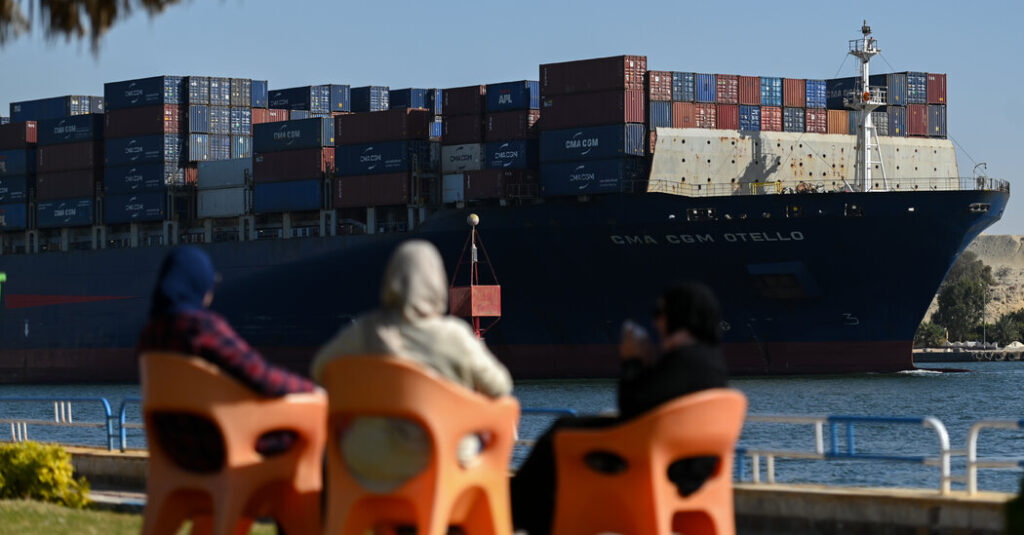IMF Increases Financial Aid to Egypt Amid Economic Turmoil
The International Monetary Fund (IMF) has announced plans to more than double its financial aid to Egypt, raising its support from an initial $3 billion, announced in October 2022, to a total of $8 billion. This increase comes as Egypt faces its most severe economic crisis in decades, exacerbated by ongoing conflicts in neighboring Gaza and Ukraine.
During a recent news conference, Ivanna Vladkova Hollar, the IMF’s mission chief to Egypt, highlighted that the country’s already struggling economy has been further impacted by the conflict between Israel and Hamas, which has significantly hampered Egypt’s crucial tourism industry. Additionally, disruptions in the Suez Canal, stemming from attacks by Houthi militants on Red Sea shipping routes, have halved the canal’s revenue.
Egyptian Prime Minister Mostafa Madbouly expressed optimism about the IMF deal, stating it would allow the government to secure an additional $1.2 billion from the IMF’s environmental sustainability fund. This influx of capital is also expected to encourage other development partners, including the World Bank and the European Union, to provide further financial assistance to Egypt, aiding in its quest for financial stability.
In a separate development last week, Egypt finalized a landmark $35 billion agreement with the United Arab Emirates for infrastructure development along its Mediterranean coast. Egyptian officials have lauded this investment as the largest in the nation’s history.
On the domestic front, Egypt’s Central Bank took drastic measures to tame soaring inflation by devaluing the national currency by over 35 percent and raising interest rates by 600 basis points. This marked the fourth devaluation in two years, reflecting the severe pressures on the Egyptian economy. Prime Minister Madbouly emphasized that these steps are part of a broader structural reform plan aimed at increasing foreign currency reserves, reducing debt, attracting foreign direct investment, and achieving high economic growth.
The Egyptian government, in collaboration with the IMF, is also committed to implementing social protection measures to shield vulnerable populations from the adverse effects of these reforms.
Over the past 18 months, Egypt has faced a crippling foreign currency shortage, severely affecting its import-dependent economy. Prices of basic goods have skyrocketed, debt levels have reached unprecedented highs, and the currency’s depreciation has eroded purchasing power and savings. Inflation hit a record 40 percent last summer, prompting the Central Bank Governor, Hassan Abdalla, to outline a medium-term plan aimed at bringing inflation down to single digits.
In response to mounting economic pressures, the Egyptian government has pivoted its strategies, including halting some costly megaprojects initiated by President Abdel Fattah el-Sisi, such as a luxurious new capital in the desert. The IMF had also conditioned further disbursements of the initial loan on economic policy reforms, which included promoting private-sector growth by dismantling the competitive advantages of military-owned enterprises.
Egypt’s economic woes have been compounded by several external shocks over the past decade, including the coronavirus pandemic and the war in Ukraine, which disrupted both tourism and essential wheat imports. President el-Sisi attributes the prolonged economic instability to the aftermath of the 2011 uprising that ousted President Hosni Mubarak. However, public sentiment, as reflected in daily life and social media, often places the blame on President el-Sisi for pursuing grandiose projects at the expense of economic stability, thereby weakening Egypt’s regional influence.
Critics also argue that the IMF’s past interventions have not sufficiently addressed the underlying issues of Egypt’s economy. Mohamed Fouad, a financial consultant and former Egyptian parliamentarian, believes the IMF must now take a more nuanced approach. He highlighted the period between 2016 and 2020 as particularly problematic, where macroeconomic improvements were celebrated without attention to foundational economic weaknesses.
As Egypt navigates these turbulent times, the increased IMF aid and subsequent economic measures will be critical in determining its path toward financial recovery and stability.
For more information about the IMF, visit: IMF Official Website.
